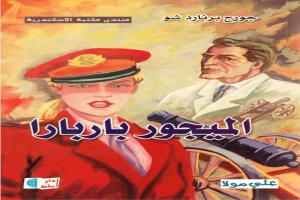Newly released
This book is new and will be uploaded as soon as it becomes available to us and if we secure the necessary publishing rights.

الميجور باربارا Book PDF
(0)
Author:
George Bernard ShawNumber Of Reads:
31
Language:
Arabic
Category:
literatureSection:
Pages:
146
Quality:
good
Views:
1037
Quate
Review
Save
Share
Book Description
George Bernard Shaw
Shaw was born on July 26, 1856 in Dublin, Ireland to a middle class and had to leave school at the age of fifteen to work as a civil servant. His father was a drunkard, addicted to alcohol, which caused him to react by not approaching alcohol throughout his life. He was also a vegetarian and did not eat meat, which had an impact on his longevity and permanent health. His mother left home for London with her two daughters, and Shaw joined them in 1876. He did not return to Ireland for nearly thirty years. Bernard Shaw lived a poor and miserable life in his youth, and when he became rich, he did not need that award, which is sometimes given to those who do not deserve it.. And because his life was in its infancy a struggle against poverty, he made the fight against poverty a main goal of everything he wrote and he saw that poverty is the source of all sins. Evils such as theft, addiction and deviation, and that poverty means weakness, ignorance, disease, oppression and hypocrisy. This is evident in his play "The Major Barbara", in which he deals with the subject of poverty, capitalism, and the hypocrisy of charities. When he left for London, he began to frequent the British Museum to educate himself, which was a great credit for the originality and independence of his thought. His literary career began in London, where he wrote five novels that did not have much success: "Immaturity", "The Irrational Knot", "Love Between Artists", "The Career of Cashel Byron" and "The Socialist and the Non-Socialist", but later became famous as a music critic in one newspapers. He then became involved in politics and began his activity in the field of socialism and joined the Fabian Society (an English society whose members sought to spread socialist principles by peaceful means.) Shaw was a fan of the Norwegian poet and playwright Henrik Ibsen (considered the greatest playwright of all time. in the use of theater to address social issues). Ibsen's influence on Shaw was evident in his early days. Although he left school early, he continued to read and learned Latin, Greek and French, and this was like Shakespeare who left school as a child to help his father. However, the lack of education in schools did not deter him from gaining knowledge and self-learning. Schools, according to Bernard Shaw, "are nothing but prisons and prisons." He was a feminist and an advocate of income equality. Despite the atheism of George Bernad Shaw, his ideal was the Prophet Muhammad, may God bless him and grant him peace. . He wanted to call for that thought that he believed in through a theatrical performance, so he could only portray his religious hero in a public play, to spread his religious views in terms of the struggle for freedom of opinion, and in terms of deliverance from blind fanaticism, and in terms of freedom from exclusion Authority, he wanted to write the play "Muhammad" to cast his views on one level. Bernard Shaw was one of the most famous who refused the Nobel Prize when it was presented to him and said: “This is a lifeline that is thrown to a man who has already reached safety, and is no longer in danger.” He died on November 2, 1950
Book Currently Unavailable
This book is currently unavailable for publication. We obtained it under a Creative Commons license, but the author or publisher has not granted permission to publish it.
Rate Now
5 Stars
4 Stars
3 Stars
2 Stars
1 Stars
الميجور باربارا Quotes
Top Rated
Latest
Quate
Be the first to leave a quote and earn 10 points
instead of 3
Comments
Be the first to leave a comment and earn 5 points
instead of 3